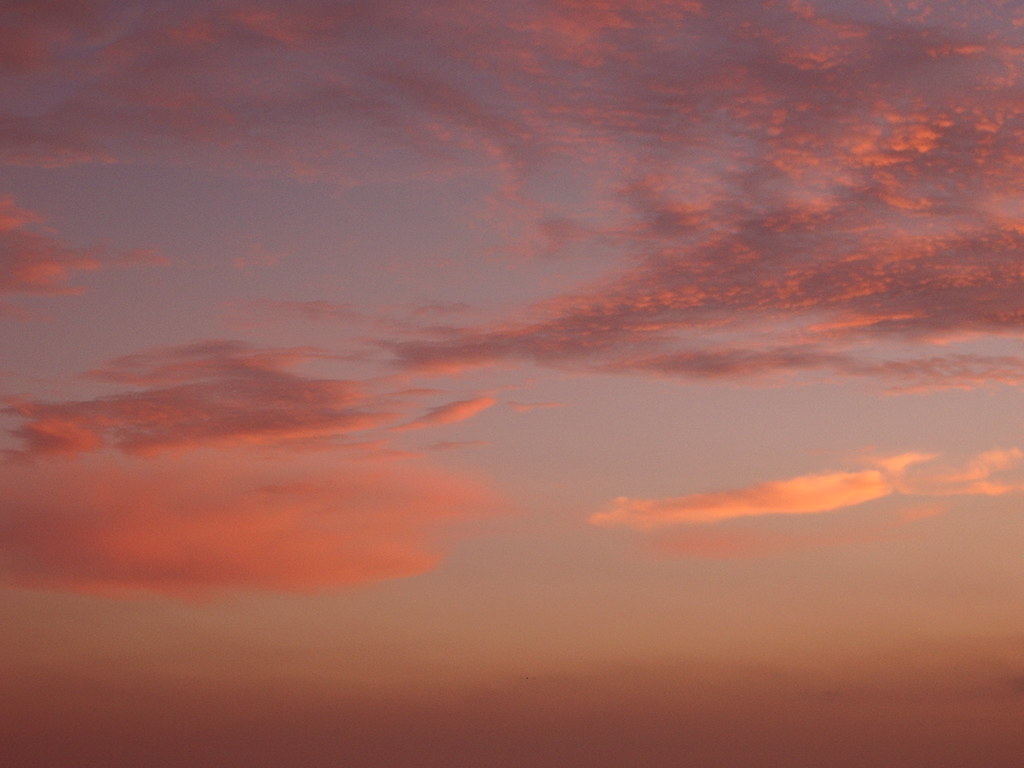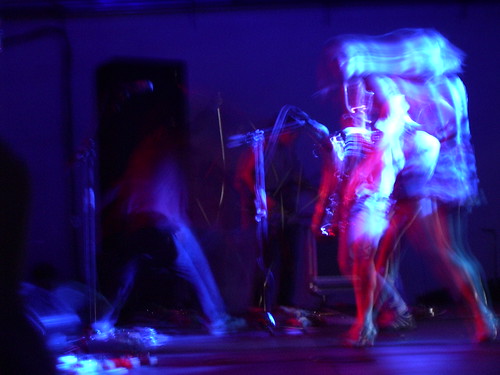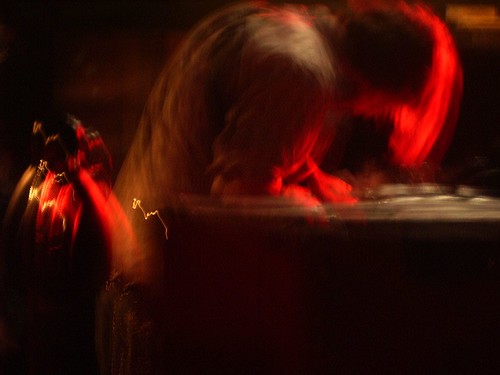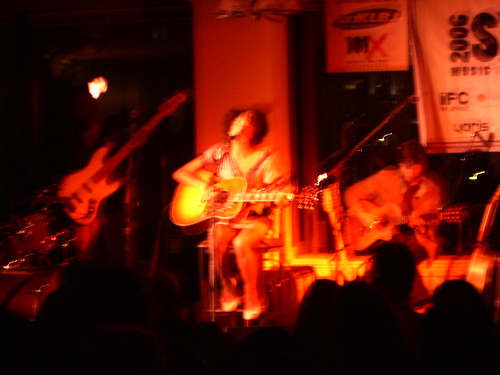[This profile first appeared in Kerrang! in 2004]

“It’s like sex, it’s a simple physical rush that happens, and I think more women should explore that part of themselves; to leave their heads, to be more of a primitive, physical person.”
You find us in the luxuriously décor-ed bar of London’s swanky Royal Garden Hotel, a breath-taking view of
“I don’t know whether it was because I was Canadian, because I came to the band two albums into their career, or if I never really dreamt of that kind of success to begin with, but, with all the success and madness of Hole, I always felt like I was looking in from outside.”
She’s mid-flow right now, but Melissa Auf Der Maur always seems to be in mid-flow. Seriously, I ask about four questions throughout our hour-plus interview, ignition-points for these digression-heavy spirals of conversation that pour forth, wild and infested tales of her childhood in Montreal and her liberal upbringing, of her beliefs on a wide variety of subjects, her dreams and desires, her love of music, her sui generis path through the rock industry. She talks like someone who has a great deal to say, who’s composed and considered these stories and theories over the years sat in the shadows of Courtney Love or Billy Corgan, relishing her chance to be heard now. The words and ideas gush forth, wild and spirited, and there’s no stopping her, not that you’d want to.
“When I was in my first band in Montreal,” she smiles, “Back in 1991, 1992, no-one was thinking of becoming big, successful rock’n’roll stars, no way. I thought maybe I’d do a tour in a van, and if I was lucky, Touch & Go would put out my one and only record. If I was lucky.”
Of course, Melissa Auf Der Maur was lucky, beyond her wildest dreams. In 1994, she joined Hole to fill the gap left by the tragic overdose death of Kristen Pfaff; five years later, as Hole disintegrated, she joined her favourite band, Smashing Pumpkins, for their final hurrahs. Her fast-track journey through the world’s enormodomes saw her skip several classes of her rock’n’roll education.
“I’d played exactly seven club shows when I joined Hole,” she grins, explaining her excitement at playing her first ever tour of the world’s ‘toilet’ circuits, venues her previous bands wouldn’t even play for ‘secret shows’. “I want to introduce the music on an intimate level,” she continues, “The way I like to discover music. I feel like I’ve got a gap in my experience, because I’ve never toured like that. No-one in my band has ever toured before; they’re so appreciative of the experience, so inspired. They’re feeling the magic I felt when I first realised you could connect with the entire world by playing in a touring rock’n’roll band.”
She rolls up the sleeves of her dressed-down, homely sweater, a blossoming of milk-chocolate freckles snaking all the way up her pale arms; her wild strawberry hair is all scrunched down under a woolly hat, and there’s no make-up on her face, but her star-power is unmistakeable, emanating mostly from the twin qualities of self-possession and a strange, older-than-her-years wisdom that mark her words and actions.
“When you’re young and when you’re old, you know the truth,” she announces, “Everything in between is sort of weird, trying to be cool, trying to fit in. I feel like an elder in the world of rock’n’roll, I’ve been doing it for so long. I’ve seen so much, I can get back to the innocence of it. That magic of when you first fell in love with music, it’s comparable with the first time you ever fell in love. You can’t fall in love for the first time ever again, of course, but you can make contact with that original, magical feeling that inspired you to live.”
Those “weird, inbetween” times she references above, you imagine, might be her years in Hole and Smashing Pumpkins. She didn’t spend the time pining for the spotlight, a frustrated frontwoman, she argues.
“I wanted to develop, not only as a musician, but as a person. I wanted life experience, to travel the world, understand who I am, what it is my message is. I’m a very patient person, even in love. I’ve avoided long term relationships, I wanted to be alone as long as I could, so when I found that person, I could really appreciate them.”
Melissa is, you sense, a particularly sensible person, particularly within the context of rock’n’roll and its more superficial values. She talks of the American dream of success, the kind of thing she experienced tangentially with Hole and the Pumpkins, of fame for fame’s sake; almost spits at the mention of reality TV programmes, and scowls at the way music now is commodified into “more and more of a Coca-Cola, McDonalds product”. But it would be most un-Melissa thing, to be defeated in the face of such things.
“I think the more superficial the world gets, the more people will explore their own inner worlds,” she declares. “Maybe this is all some weird exercise we have to go through, to become more at peace with our inner, spiritual lives? There’s a song on my album, ‘My Foggy Nation’… Gawd,” she gawks, “I never want to be the sort of person who quotes their own song lyrics, but… ‘Why must I find that falling down brings my hopes high? Why must you cry when I fall down? It helps me with the truth inside’.”
She pauses for a moment after quoting the lyric, part-savouring it, part-giggling at the seeming pomposity of it all. “Hard times bring truth and strength,” she testifies, finally. “The music industry can be fucked, but we’re still going to be fine.”
Melissa plants credit for her courageous and optimistic outlook squarely at her parents’ feet. Her late father, Nick Auf Du Maur, was a famous and much-loved
“I told my mother I wanted to put all the money I made into my solo album,” she remembers, “And she replied, ‘Good idea. What do you need a house for? Make the record.’ Do what you want, be happy – that was their concern when I was growing up. The retirement plan is not important, don’t live for the future, live for now.”
Melissa says that she felt the same encouragement from her producer, Masters Of Reality’s Chris Goss, when recording her muscular, mystical album. “I told him, ‘I’m not afraid of sounding crazy, I don’t care what I sound like, I just want to be myself. And he was so nurturing and supportive; all I needed was one hand on my back saying, ‘you can do it Melissa’.”
She traces her love of music all the way back to FACE. “Fine Arts Core Education,” she laughs. “Imagine the school from ‘Fame’, only full of freaky hippy kids. So inspiring. My teacher, Mr Euan Edwards, conducted a children’s choir of two hundred 12-14 year olds to sing the Mozart Requiem, with an orchestra. It was the most powerful, physical thing that’s ever happened to me. I was young, I had barely any life experience, and the music travelled through me, the Gothic intensity of it. That, hands down, showed me the power of music. Later I had dreams of music entering your blood and becoming part of you.”
What followed was a familiar journey through hard rock, from Zeppelin through to the visceral cresting of Nirvana and the underground that followed them. The attraction to rock, she muses, comes not least from the exquisite pleasure of a most feminine girl exploring what she describes as the ‘masculine’ qualities of rock’n’roll…
“My mother reads out this poem on the album – ‘When she was good, she was very, very good / but when she was bad she was horrid’ – when she read it to me as a kid, it secretly excited me, because I didn’t know which I was. I like to work within opposites: Happy and Sad, Masculine and Feminine… The energy between them, that’s what love is, what life is, like the energy between birth and death.
“Aggression, distortion, power,” she laughs, “I explore my masculine traits every time I put my bass on, every time I wanna make something that’s loud and punches you with the sound. I secretly hope my record will seduce women into exploring that side. Because when I go to a rock show and I bang my head to the loud powerful rock music, the sound, the power, the impact of that loud music, I am liberated.”
At this point, somewhat appropriately, we are interrupted by the klaxon blare of the hotel’s fire alarm, and ushered outside.
It seems like a fair time to conclude the interview, but Melissa has a few more words left. “If life has taught me anything, it’s that you must have no fear,” she offers, sweetly. “When I made this record it was like a commitment, ‘Have no fear Melissa, just be yourself’. If you take risks, good things will come to you; have no fear in love, take a risk, go for it. Even if you might get your heart broken, do it. Fear is deadly, it ruins people’s lives. We have it easy, and we’d better start appreciating how good we have it, because it could end tomorrow. We could be living in some controlled evil state, the president of the US might remain in power for the next four years and we’re really gonna be fucked, so we can’t afford to be any more afraid than we already are. So yeah, have no fear please.”
And with that, she plants a kiss on my cheek, whispers “I can tell you’re sensitive, that makes it so much easier to get my message across,” and strolls back into the hotel, past the swanky fellow guests and the panicked, crotchety staff, gloriously oblivious to the alarm that still wails. But then, following her own path is a habit Melissa Auf Der Maur is winningly at home with.
(c) Stevie Chick 2004




No comments:
Post a Comment